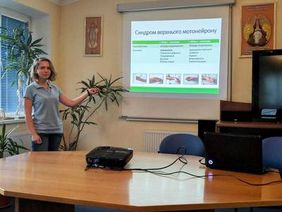The essence of the study lies in randomly dividing patients into two groups with the same number and characteristics. Each group underwent one clinical intervention – biomechanical spine correction or a placebo-controlled procedure. Such experimental conditions have allowed scientists to evaluate intervention effects. The Neuroflexor apparatus was used to measure spasticity and obtain reliable quantitative data that made it possible to compare changes in the indicators before and after the treatment.
The study results show a significant decrease in spasticity in the group that underwent biomechanical spine correction. A slight decrease was detected in the control group, which cannot be considered statistically significant.
These data suggest that muscle spasticity in patients with cerebral palsy decreases under the influence of biomechanical spine correction.
The scientific team expresses its sincere gratitude to all the patients and their parents who participated in the study and to their colleagues for their assistance!
Study on the Effects of Biomechanical Spine Correction on Muscle Spasticity

